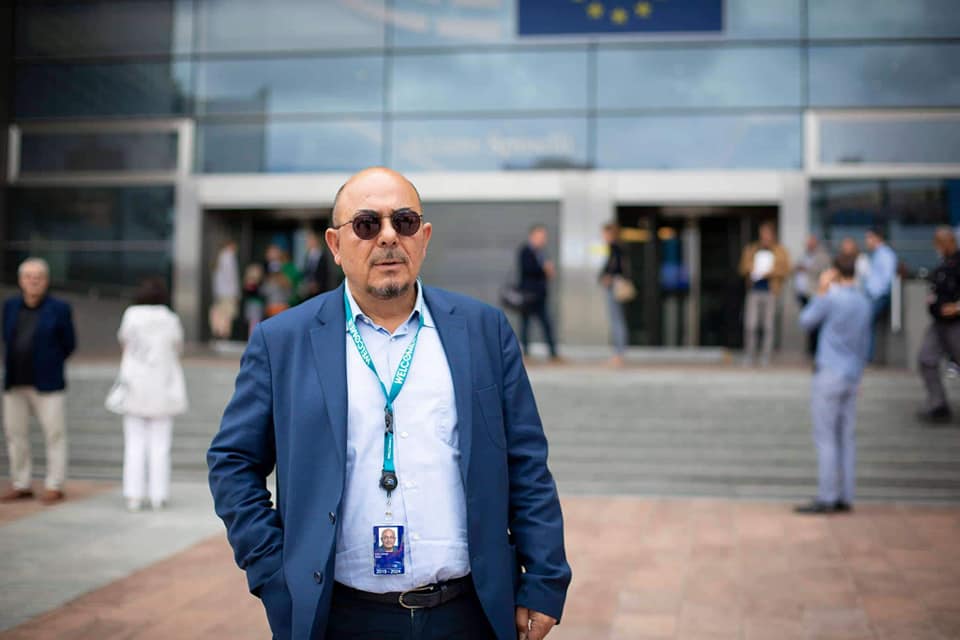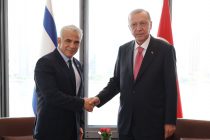A CYPRUS MEP has followed through with his plans to open an office in the Turkish Republic of Northern Cyprus (TRNC). The decision by Niyazi Kızılyürek, an MEP for the Greek Cypriot communist party Akel, was slammed by South Cyprus parties.
The office, located on Muzaffer Paşa Caddesi, near the Ledra Palace crossing, was formally opened with a ceremony on Friday evening.
Akel leader Andros Kyprianou made a speech, while dignitaries such as the UN’s Special Advisor on Cyprus Elizabeth Spehar, and MEPs and ambassadors of various EU states were also in attendance.
Prof Kızılyürek, who has lived and worked on the Greek Cypriot side of the island since the 1990s, said the move, which he announced at the beginning of October, fulfilled a pledge he made in the run-up to May’s European elections that saw him become the first-ever Turkish Cypriot MEP.
His election was dismissed by TRNC political party leaders at the time, who said he did not represent Turkish Cypriots.
Several political parties in the South voiced their anger about the plans in the run-up to the office’s opening on Friday.
The Solidarity Movement claimed an office in the TRNC would be “illegal” because, according to the party, MEPs are only allowed three offices – one each in Brussels, Strasbourg and their place of residence. “Niyazi Kızılyürek does not live in the occupied areas,” the party said.
The far-right National Popular Front (Elam) described Kızılyürek’s decision as “provocative”, “unacceptable” and a “crime against the homeland” according to media reports. The party claimed that the office is a “property of a Greek Cypriot refugee” that is being “turned into a subject of usurpation by a ‘representative’ of the Republic of Cyprus in the EU while it will be financed by Europe’s own funds”.
Elam also accused Akel of “serving Turkish interests”, adding that EU laws would apply to North Cyprus “only after a solution”.
Akel defended Kızılyürek’s plans, stating that Cyprus is the “common home of Greek Cypriots and Turkish Cypriots, and not a second Greek state”. The office would be based in a “Turkish Cypriot property”, it added.
News of Prof Kızılyürek’s TRNC office came shortly after he revealed that he had asked the European Commission last month to make Turkish the 25th official language of the EU.
Prof Kızılyürek meets with British Cypriot MP Bambos Charalambous (centre)
Turkish, along with Greek, is an official language of Cyprus but has yet to be added to the EU’s list. Greek is an official EU language due to Greece’s membership.
Cyprus acceded to the EU in 2004 following the Greek Cypriot side’s unilateral membership application – meaning that Turkish Cypriots are also regarded as citizens of an EU country. However the bloc’s “acquis communautaire”, its body of legislation and regulations, is suspended in the TRNC due to the lack of a solution on the island.
“In his letter of 17 February 2016 to the Presidents of the Council, Commission and European Parliament, the President of the Republic of Cyprus, Nicos Anastasiades, stated that Turkish is one of the official languages of the Republic of Cyprus and asked for it to be introduced as an official EU language,” Prof Kızılyürek said in a written parliamentary question, referring to Article 342 of the Treaty on the Functioning of the European Union on the rules governing the languages of EU institutions.
“Turkish Cypriot citizens of the EU are certainly expecting their mother tongue to become an official language of the EU.
“Additionally, in the 2019 European Parliament elections, a Turkish Cypriot MEP was elected for the first time, by both Greek and Turkish Cypriots.
“Bearing the above in mind, what measures will the Commission take in order to accelerate the necessary procedures for the introduction of Turkish as an official EU language?”
All EU member states would need to agree to Turkish becoming an official EU language, according to the website euractiv.com, but there is “currently no consensus on the matter in the Council of the EU”.
Luxembourgish is the only other official language of an EU member state that is not recognised at the EU level, the website adds, because Luxembourg has not made any formal request.
Main photo, top: Niyazi Kızılyürek MEP outside the EU Parliament building, July 2019. Photo © Facebook/Niyazi Kızılyürek





